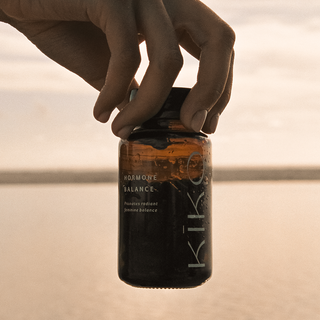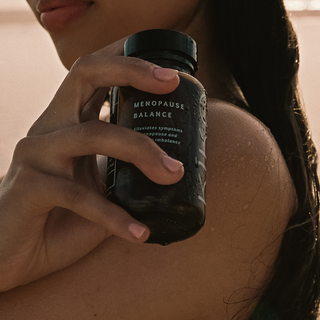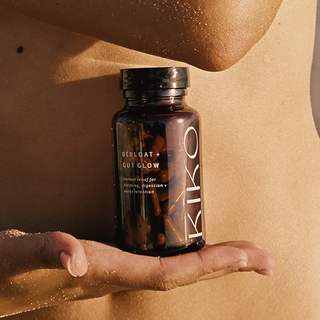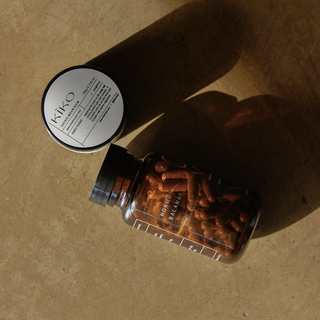
In our always-on world, juggling work, family, and personal goals often feels like a marathon without a finish line. The result? Many women, whether active, wellness-focused, or simply burned out, are left wondering why their energy levels are perpetually low despite their best efforts. If you've been feeling consistently exhausted, foggy, or just not yourself, adrenal fatigue might be the missing piece of the puzzle. In this guide, we'll explore how adrenal fatigue can affect you and provide targeted strategies to help you reclaim your energy, balance, and vitality.
What is Adrenal Fatigue?
Adrenal fatigue refers to a collection of symptoms that arise when the adrenal glands - tiny organs above your kidneys responsible for producing stress hormones like cortisol - become overworked. Think of your adrenals as your body’s natural battery pack, helping you power through physical, emotional, or mental stress.
But chronic stress, whether it’s from intense workouts, long work hours, or lack of rest, can deplete your adrenals, leading to symptoms like:
- Chronic fatigue that doesn’t improve with rest
- Brain fog and difficulty concentrating
- Hormonal imbalances (irregular cycles, PMS)
- Weakened immune system
- Poor stress tolerance
These symptoms can show up differently depending on your lifestyle.
If you’re active and into sports and working out, your high-intensity workouts push your body to its limits, which can put extra strain on your adrenal glands. Over time, this can lead to recovery issues, muscle fatigue, and increased inflammation.
If you're burned out from work, family responsibilities, or life’s daily stressors in general, every task can feel monumental. Your body might feel stuck in a vicious cycle, but it’s not too late to bring it back to balance!
If you’re simply interested in general wellbeing, implementing daily self-care rituals targeted specifically at supporting adrenal health is paramount.
Hydration and Adrenal Health: The Vital Connection
Hydration plays a fundamental role in adrenal health, and yet it’s often overlooked. When we think of hydration, we tend to focus solely on drinking water, but the real key to maintaining healthy adrenal function lies in ensuring proper mineral and electrolyte balance. Without this, even the best efforts at drinking enough water can fall short.
Your adrenal glands are particularly sensitive to dehydration. When you're dehydrated, the body struggles to regulate fluid balance, which in turn affects the production of key hormones like cortisol. This creates a vicious cycle - stress depletes your adrenals, and dehydration makes it harder for your body to manage stress.
Proper hydration does more than just quench your thirst. It helps to restore balance in your body, ensuring that nutrients and oxygen are delivered efficiently to your cells, and that waste products are flushed out. For those dealing with adrenal fatigue, hydration goes hand in hand with electrolyte balance - specifically magnesium, sodium, and potassium.
Especially if you work out regularly, electrolytes are crucial for recovery, preventing muscle cramps, and sustaining energy levels during intense workouts.
If you’re already depleted due to burn out and struggling to hit the gym, all is not lost! Proper hydration with electrolytes can help support your adrenal recovery to get you to a stage where you feel well enough to take the steps necessary to create a life of balance and vibrancy.
The Mineral Connection: Electrolytes and Adrenal Function
When most people think of electrolytes, they likely picture sports drinks or workout supplements. But these essential minerals - magnesium, sodium, and potassium - are not just for athletes. They are crucial for everyone, especially those managing adrenal fatigue. Here’s how they help:
Magnesium
Often referred to as the “relaxation mineral,” magnesium is involved in over 300 enzymatic processes in the body. It helps regulate blood pressure, supports muscle and nerve function, and plays a pivotal role in energy production. When your magnesium levels are low, you may feel more stressed, experience muscle cramps, or struggle with sleep. For those dealing with adrenal fatigue, magnesium can be a game-changer in reducing stress and promoting restful sleep, both of which are essential for adrenal recovery.
Sodium
Your body needs sodium to maintain proper fluid balance, but it’s easy to overlook this essential mineral, especially with the widespread fear of “too much salt.” However, low sodium levels can lead to issues like fatigue, dizziness, and even confusion. When you're under chronic stress or battling adrenal fatigue, your sodium levels can drop, making it even harder to keep your energy levels up. Sodium works alongside potassium to regulate fluid balance and ensure that water is properly absorbed and transported into your cells.
Potassium
Like magnesium, potassium is key for muscle function and energy production. It also helps maintain the balance of fluids in your body. Potassium deficiency can cause symptoms like weakness, cramping, and fatigue - issues that are all too common in those experiencing adrenal fatigue.
Together, these minerals help your body absorb and utilise water more efficiently, promoting deeper hydration at a cellular level. This means that when you hydrate properly, you’re not just drinking water - you’re nourishing your body with the minerals it needs to function optimally. For anyone struggling with adrenal fatigue, electrolyte balance for adrenal function is absolutely critical.
Game-Changing Hydration on its Way
If you’re looking for a way to take your hydration and adrenal support to the next level, we’ve got something special in store for you! Watch this space for the latest Kiko Vitals innovation, which will be launching in January to offer invaluable support on your path to healing from adrenal fatigue through proper cellular hydration!

More Ways to Manage Adrenal Fatigue
Recovering from adrenal fatigue is a holistic process that involves a combination of lifestyle changes, stress management, diet, and supplements. Here are some strategies that can help…
Support Your Sport
Prioritise electrolyte-rich hydration before and after workouts. Focus on post-workout meals rich in protein and magnesium (e.g., salmon and leafy greens). Last but certainly not least, add recovery days or low-impact exercises to your routine.
Beat the Burnout
Avoid caffeine-based “pick-me-ups” that can worsen adrenal strain - rather start your day with a warm glass of lemon. You can also incorporate adaptogens like ashwagandha or rhodiola into your daily health routine to reduce stress. You’ll find powerful adaptogens like ashwagandha and maca in the Kiko Vitals Hormone Balance & PMS Support supplement.

Address Your Stress
In addition to adding stress-supporting supplements, also start practising relaxation techniques like yoga, meditation, deep breathing, or mindfulness that can help calm your nervous system and support adrenal health.
Be Mindful of Your Macronutrients
Focus on small, nutrient-dense meals that stabilise blood sugar and are rich in whole foods, healthy fats, lean proteins, and plenty of vegetables. Include foods that support adrenal health, such as leafy greens (for magnesium), avocados (for potassium), and sea salt (for sodium). Avoid excessive sugar and processed foods, which can put additional strain on your adrenals.
Reasses Your Relationship to Sleep
Adequate, quality sleep is crucial for adrenal recovery. Ensure that you’re getting 7 - 9 hours of sleep each night, and try to maintain a consistent sleep schedule to help regulate your cortisol levels.
There’s Hope from Here
Adrenal fatigue can be an overwhelming condition, but with the right approach, it is possible to manage and even recover. Watch this space for the launch of the perfect addition to your daily routine for adrenal support, hydration, and overall wellness. Because when your body is properly nourished and hydrated, you’re ready to take on the world - stress-free and full of energy!



